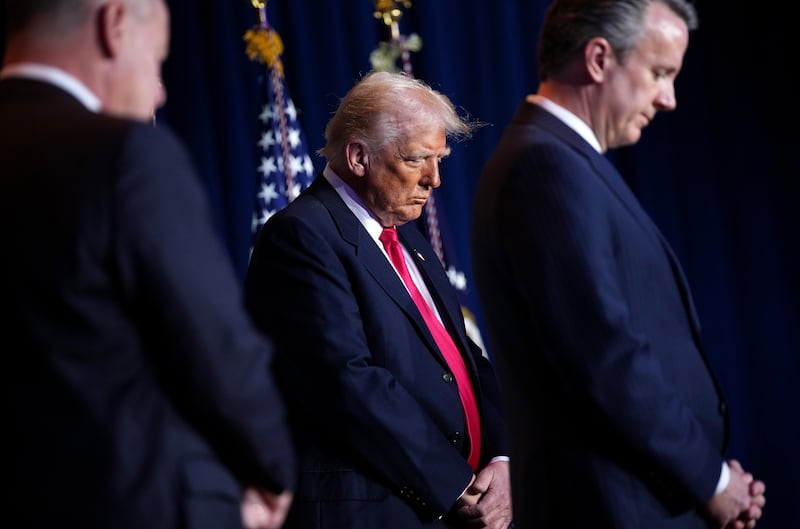President Donald Trump told the annual National Prayer Breakfast in Washington, D.C. Thursday that he wants the United States to “bring religion back,” weeks into a term that has already seen him offer up red meat for his Christian conservative base.
During a careening speech—Trump said he enjoyed attending a 1957 New York Crusade event put on by evangelist Billy Graham at Yankee Stadium more than any baseball game—he claimed an added dose of religion in America will inspire Democrats and Republicans to eat lunch together.
“We have to bring religion back,” the president told a bipartisan audience, which included lawmakers from both major parties. “We have to bring it back much stronger. It’s one of the biggest problems that we’ve had over the last fairly long period of time. We have to bring it back.”
Trump campaigned on the promise that he would direct the government to prioritize issues that matter to the conservative Christians that helped elect him, or “my beautiful Christians” as he has called them, while injecting their ideological values into public policy.
On the hustings, he attacked transgender rights by lambasting “gender ideology” and claimed “God created two genders, male and female.”
Shortly after taking office last month, he enshrined those views—absent an explicit nod to the divine—with an executive order directing the federal government to “recognize two sexes, male and female,” which he wrote “are not changeable.”
Trump also pledged during the campaign to create a task force to study “anti-Christian bias” and said faith leaders would have a direct line to the Oval Office.
His first administration is especially hailed by conservative Christian groups for appointing Supreme Court justices that would go on to vote to successfully overturn Roe v. Wade, the ruling that protected abortion rights under the U.S. Constitution.

Since being sworn in last month, however, Trump and his administration have found themselves in disputes with religious leaders on the left and right.
Trump criticized a sermon by the Rev. Mariann Budde at a national prayer service the day after his inauguration, during which she asked for mercy for LGBTQ+ people and migrants.
The Catholic Church, including longtime Trump supporter and conservative New York Archbishop Timothy Dolan, has clashed with the administration over its hardline immigration policies.
Meanwhile, Evangelical groups have objected to the rowback of refugee programs and the removal of churches from a “sensitive-areas” list in order to allow immigration officials to target places of worship. Those groups argue the measures violate the longstanding tradition of churches as places of safe haven.
On Thursday, Trump kept a rare conciliatory tone throughout his speech, choosing to frame an American embrace of religion as something that would inspire bitterly divided partisans to figuratively and literally break bread.
“We have to put our country first, making America stronger and greater and more exceptional than ever before, and we have to make religion a much more important factor now,” he said. “If we do that, it’s going to be our job is just going to be much easier. It unifies people. It brings people together. Democrats are going to be able to have lunch again and dinner with Republicans.”
Trump also made a rare overture about his own efforts to at least reach an understanding about bipartisan disagreement.
He described talking to a “very smart” guy on Wednesday who was upset that he had signed an executive order banning transgender women from participating in female sports.
“He’s a good person and just believes it, and just believes it, it’s not going to be easy to convince him otherwise,” Trump said.
But he then shut down the idea of political compromise: “So where is a middle ground? It’s hard to have a middle ground if there’s two ways. I mean, you can either do it or you can’t.”
Trump earned laughs by adding a joking aside to the story he’s told multiple times about the assassination attempt on his life in Butler, PA last year, crediting the event with renewing his faith in a higher power.
“It didn’t effect my hair, can you believe it?” he quipped. “Might have touched it, but not where it counts.”
Trump’s joking and peacemaking rhetoric diverged significantly from the remarks he gave at the final prayer breakfast during his first term in 2020.
There, he took jabs at House Rep. Nancy Pelosi (D-CA) and Senator Mitt Romney (R-UT) over their religious sincerity as they sat in the audience.
“I don’t like people who use their faith as justification for doing what they know is wrong,” he said, alluding to the Republican Utah Senator invoking his faith to explain why he voted to impeach Trump during his first term.
“Nor do I like people who say, ‘I pray for you,’ when they know that that’s not so,” he said of Pelosi, who said during her first term that she prays for the president despite their partisan divide.









